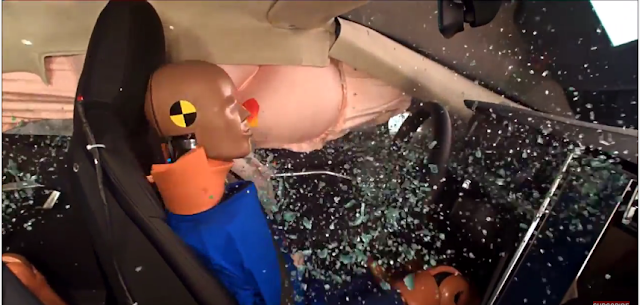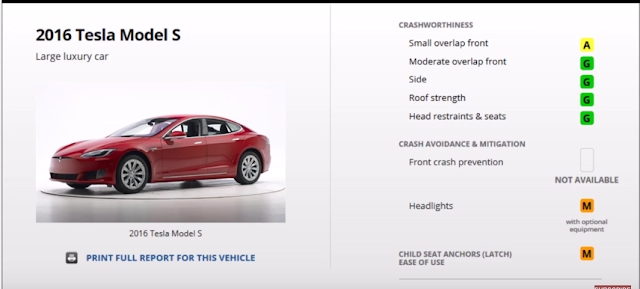
2016 Tesla Model S Luxury Car Crash Test Videos
Tesla Model S built after September 2016 40 mph small overlap IIHS crash test
Overall evaluation: Acceptable Tesla Model S built after October 2016 40 mph moderate overlap IIHS crash test Overall evaluation: Good Tesla Model S built after October 2016 31 mph side IIHS crash test
Overall evaluation: Good Recent crash tests reveal potential safety issues with Tesla Model S
The Insurance Institute for Highway Safety decided to put four all-electric and hybrid electric vehicles to the test for safety.
Compared with the 2017 Prius Prime and the 2017 Chevy Volt, the BMW i3 and the Tesla Model S weren't just safe enough to merit a "Top Pick +" by the IIHS.
"The IIHS is looking at a small overlap frontal crash, a moderate overlap frontal crash, side impact, roof strength, the head restraints, headlights and advanced front crash prevention," R&T Máté Petrány wrote.
The organization also assessed the vehicles' front-crash avoidance abilities; and their headlights.
The IIHS tested Model S vehicles built after October 2016 and according to its test results, the Model S fell short of the highest safety rating in a few key areas.
First, the driver's side seat belt didn't adequately restrain the occupant in a front overlap crash, causing the dummy's head to hit the steering wheel.
Secondly, the roof of the Model S P100D that was tested wasn't strong enough to ensure safety in a rollover, due to the car's weight. The Model S earned an "acceptable" rating in these two categories.
Lastly, the organization gave the 2017 Model S a poor rating for its headlights.
In a statement to Business Insider, a Tesla spokesperson said that the company is already working to fix the issues and that it's "committed to making the world's safest cars."
"We proactively develop updates and aggressively implement changes onto the production line in record time any time there is a substantial benefit to customer safety.
One of the improvements recently introduced in January 2017 specifically addresses the “Acceptable” (or second-highest) rating that the Model S achieved in the small overlap frontal crash test, and we expect new tests to yield the highest possible rating (“Good” rating) in the crashworthiness category," the spokesperson said.
It's worth noting that Tesla's Model S has received a 5-star safety rating from the National Highway Traffic Safety Administration, as well as the highest safety rating from the European New Car Assesment Program.
The BMW i3 also had a problem in the small frontal overlap crash scenario: the vehicles couldn't fully protect passengers in the rear seats.
The Chevy Volt and the Prius Prime plug-in both scored higher on the IIHS's tests.












